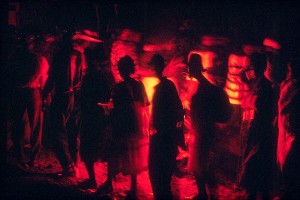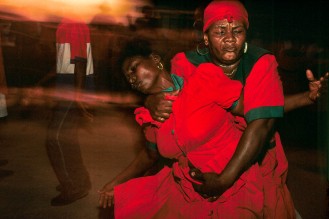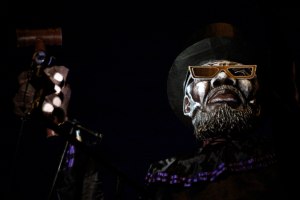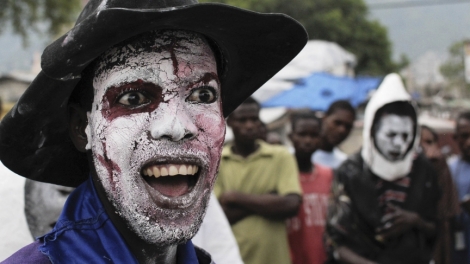“They beat me in the name of Jesus,” Josué sings in one song. “They burn me in the name of Jesus.”
The lyrics of this old vodou song date back to slavery days in the 18th Century, but their warning rings true today for some vodou practitioners — or vodouisants — who feel under attack. The old joke goes that Haiti is 70 percent Catholic, 30 percent Protestant and 100 percent Vodou.
For Josué, this is no joking matter. Last year, he took a government job as head of Haiti’s National Ethnology Office. He’s on a mission to get Haitians to realize that they need to embrace their vodou heritage — whether they agree or not.
Ground zero for the tension is Bwa Kayiman, a site in northern Haiti. A late-night meeting there in 1791 set in motion what would become one of history’s most successful slave revolts. It’s essentially where the country of “Haiti” was born — as a union of different tribes, faiths and languages.
“It was the moment the slaves said, ‘We’ve become Creoles today; we’re no longer African. We

HAITI, CABARET. A secret society practicing the Petro rite celebrates a family ceremony in October 1995. Photo by Jean-Claude Coutausse
won’t fight to return to Africa, but for this land,'” Josué said.
These days, Bwa Kayiman is a mess. On a visit with a team of ethnologists, Josué found a handful of historical sites unmarked and decaying. This is supposed to a heritage site, but buildings have been built illegally, including Protestant churches.
Josué is not happy.
“Vodou has never been a religion of conquest,” he says. “We don’t raise awareness to convert people to vodou, but to educate them about the importance of the national identity, the importance of respecting the sites, of respecting the patrimony. The churches and houses that were built on the Bwa Kayiman site is, personally, a kind of sacrilege. But it’s also an attack on the state.”
This “attack,” as Josué puts it, comes mainly from the evangelical movement. Unofficial estimates suggest about half of Haitians are Protestant these days, a rise fueled in large part by American-funded evangelical missions, churches and schools.

HAITI, CROIX-DES-BOUQUETS. Ceremony dedicated to St. John the Baptist. Two mambos (voodoo priestesses) are in a trance, possessed by the loas (spirits) in October 1995. Photo by Jean-Claude Coutausse
Elizabeth McAlister is a Haiti scholar at Wesleyan University, and a long-time friend of Josué’s.
“The evangelical movement desires to reduce vodou entirely, if they could they would have a Christian revival and transform the country to a Christian majority,” she says.
McAlister says there’s no question that foreign religious influence is affecting Haitians’ attitudes about vodou, but she says that even many Haitians feel the vodou religion and culture is something they would rather leave in the past.

A giant papier mâché version (created by one of artist Didier Civil) of Haitian voodoo spirit Baron Samedi
“Among educated and other people who see vodou as always having been denigrated, always having been insulted, the discourse on vodou are either that it’s an illegal practice or it’s a practice of superstition done by the ignorant,” she says. “Meanwhile, so much of the culture is infused with the principles of the form. So it creates a tension, psychologically — how does one represent the culture, and how does one come to terms with being from this culture which is so saturated with this religion?”
Vodou’s influence is felt just about everywhere in Haiti, from the country’s music and art to the latest locally-designed fashions and accessories on display in uptown boutiques.
As head of the Haitian ethnology office, Josué has demonstrated and lobbied to create the first national holiday to honor vodou. Like it or not, he says, vodou is soaked deep into Haiti’s local and international brand — as an aesthetic, a philosophy and a way of life.
“You can be what you want, but stay a Haitian. Stay a proud Haitian,” Josué says.

A vodou worshipper takes part in festivities on the first day of the Haitian Festival of Ancestors in Port-au-Prince.
Ferreira’s reporting was supported by a grant from the International Reporting Project.
Reporting by Susan Ferreira | Published on PRI’s The World online on January 21, 2014
Related Posts
48 Hours in Benin’s Voodoo Heartland

